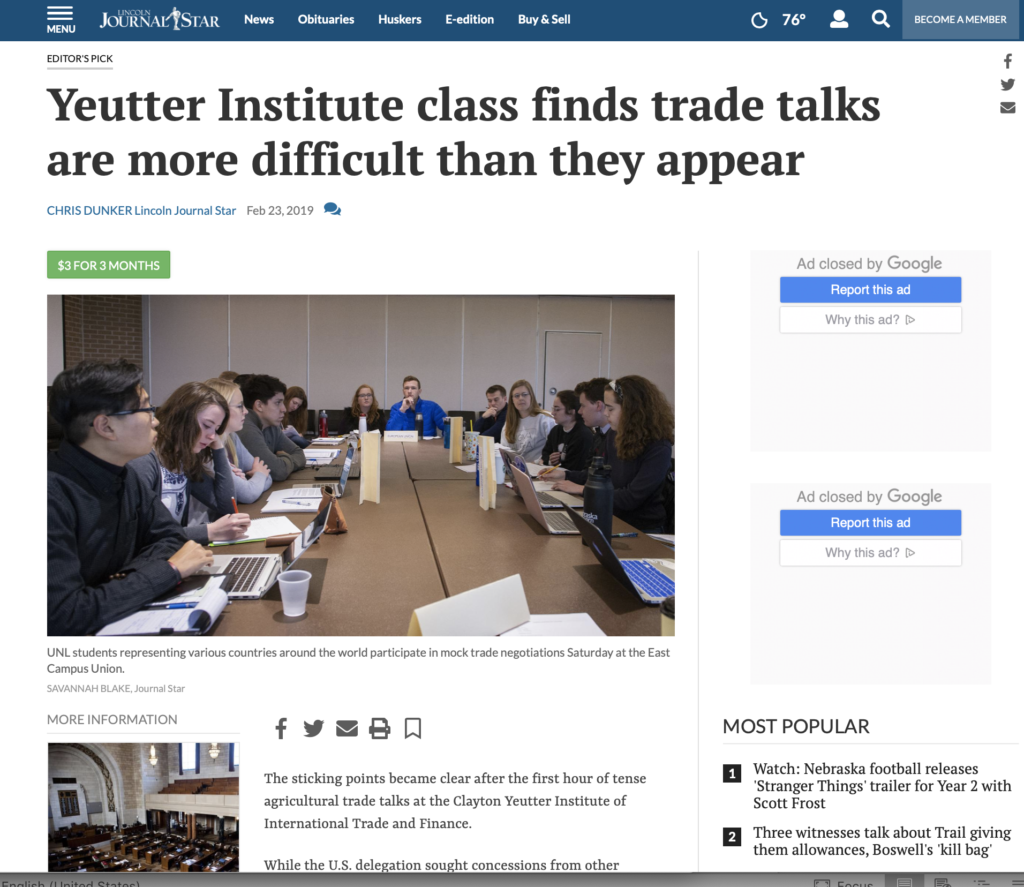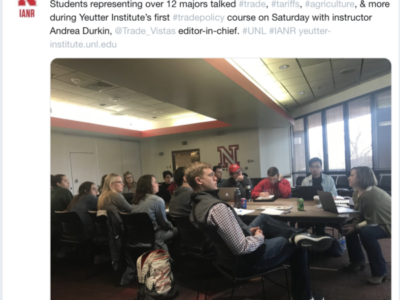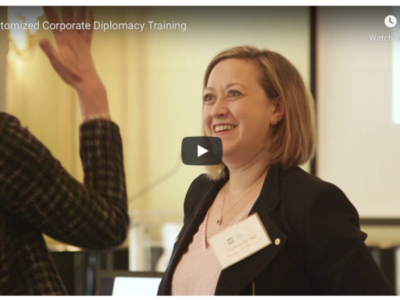Higher education reporter from the Lincoln Journal Star, Chris Dunker, came to class to cover our trade simulation. His original article may be found here.
Below is a reprint:

CHRIS DUNKER Lincoln Journal Star
Feb 23, 2019
The sticking points became clear after the first hour of tense agricultural trade talks at the Clayton Yeutter Institute of International Trade and Finance.
While the U.S. delegation sought concessions from other countries that would end distortive trade practices, a position also held by the Cairns Group of agricultural exporters, the G10 and G20 bristled at some of the specific language offered.
The European Union pursued elimination of the self-classification of economies, as well as a reduction in subsidies for producers engaged in noneco-friendly agricultural techniques, which the G10 and G20 said were not realistic expectations for those coalitions of developing and least-developed countries.
In a mock multi-lateral negotiation Saturday morning, University of Nebraska-Lincoln students hashed out trade policies and disputes pulled right from the headlines.
“Trade Policy and Negotiations: Context and Current Issues” isn’t necessarily meant to be a current events class, said Andrea Durkin, a veteran U.S. trade representative who teaches negotiation strategies, “but this is a much more dynamic time than usual in terms of trade.”
After the Trump administration imposed tariffs on a wide array of imported goods — steel, aluminum, solar panels and washing machines, among others — China and other countries have leveled retaliatory measures against the U.S.
As negotiators from both countries continue to meet in an effort to prevent an all-out trade war, Jill O’Donnell, director of the Yeutter Institute, said interest in the subject was rising at UNL, particularly in agriculture education, where many students have witnessed the effects of tariffs up close.
O’Donnell contacted Durkin shortly after winter break ended about the possibility of teaching an abridged version of the Georgetown University class she’s taught to mostly international graduate students for the past 14 years.
The two hoped eight to 10 students would be interested in AGRI 496, a one-credit “pop-up” course that would meet a total of four times in February, O’Donnell said. “We had to shut it down when we got to 20.”
Durkin said most of the students in the agricultural trade-focused class have farming or ranching backgrounds, but are engaged in several academic pursuits on campus.
“I haven’t let up on the accelerator at all because these kids are so ready,” she said. “They are pretty savvy.”
Kirk Martin, a sophomore economics major who role-played the director general of the European Union on Saturday, said the class has learned how negotiations work from the viewpoint of the United States through the lens of agriculture.
“We’ve learned that governing by committee doesn’t always work,” said Martin, of Illinois, referring to the current round of global trade talks that have been ongoing for more than a decade.
Saturday, students wrestled over whether to push for “meaningful” concessions related to agricultural subsidies or “moderate” ones. A compromise was later offered calling for “equitable” concessions, but even that was determined to be too ambiguous.
The faux U.S. trade delegation learned it must walk a delicate line between reinforcing American interests while also trying to help other countries grow their economies, which in turn would help the economy here at home.
“We’re coming in with strength, wanting to help these other countries in a cooperative way,” said Brock Vetick, a sophomore plant biology major from Lyons. “We want to look out for ourselves, but we’re not leaving anyone else out there alone.”
That has also put a target on the Americans’ backs, said Amanda Kowalewski, an agricultural economy major who portrayed a U.S. senator from Nebraska during the mock negotiation process.
“We are one of the world’s largest ag exporters, we do subsidize a lot of our commodity production, which a lot of the other coalitions don’t appreciate all the time,” the senior from Gothenburg said.
To prepare for Saturday’s group negotiation, the students spent the better part of the week formulating their coalition’s position, staking out some shared ground with other coalitions they hoped to use as leverage to come to an agreement that best aligned with their interests.
Thursday, however, Durkin, who was the chairwoman of the plenary session, threw a wrench in the negotiations, giving the coalitions new compromise language to use as a foundation for their talks.
As mock negotiations often go, student delegates offered hardline positions at the outset — part of a tendency “to put a fence around what they care about,” according to Durkin. The session later eroded to sidebar talks at the edge of the room focused on finding common ground to signal progress.
“They’re developing strategies to discuss a particular text, and learning how to negotiate within a coalition, develop a cross-coalition, and ultimately to come up with a consensus,” Durkin explained.While the students did not come to an understanding on all of the issues at hand in the two-hour session Saturday — debates over some of these issues can drag out for years — Durkin said they gained valuable insight into just how difficult negotiating trade deals can be, particularly in an increasingly complex international setting.
When real-world negotiations resume in the coming days, Vetick and Kowalewski said they’ll be watching for signs of how Nebraska could be impacted.
Vetick, who wants to work in international trade, said the trade negotiation was a good experience to understand what it takes to be able to purchase clothing made in Taiwan or alarm clocks made in China.“All this has to happen for these comforts in life that we have,” he said.
The experience of their own trade negotiation, in which five coalitions could not reach consensus on a few short paragraphs, has taught them that the process is deeper than it appears.
“Nebraska runs on agriculture; there is a lot riding on this,” said Kowalewski, who added she, too, plans to work in international trade. “It’s also way more complicated than the one page, one sector we’ve been focused on.”
Higher education reporter
Chris Dunker covers higher education, state government and the intersection of both.



